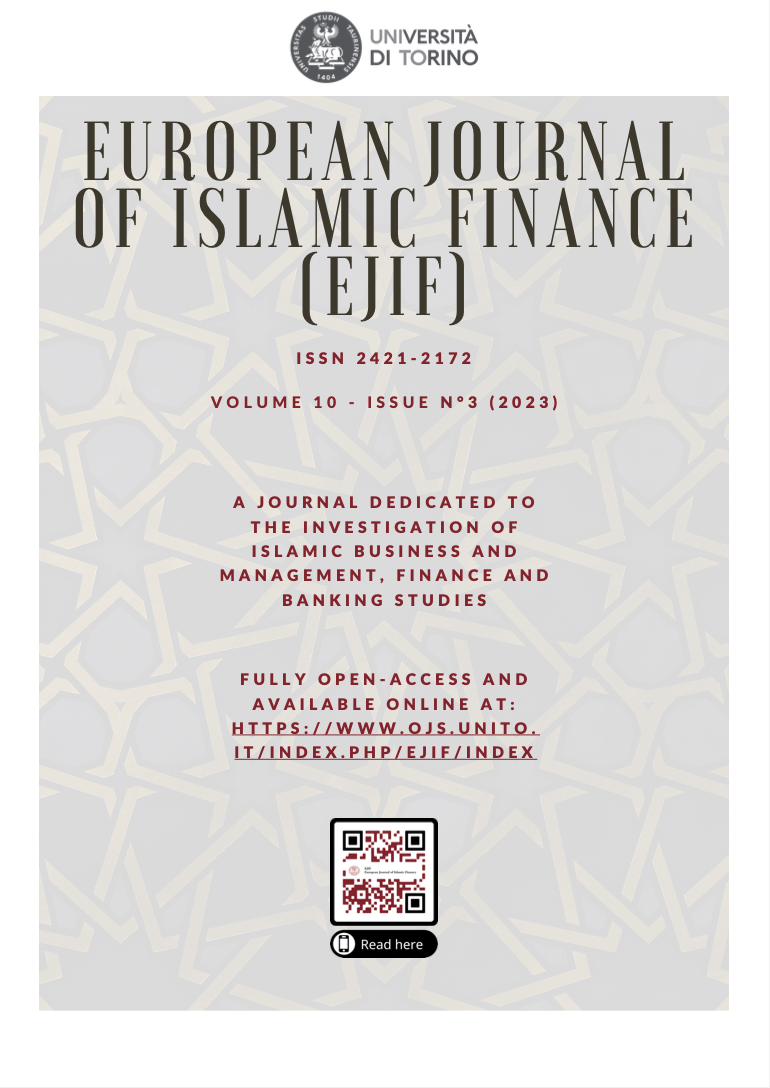Cryptocurrency in Indonesia: A Sentiment Analysis
DOI:
https://doi.org/10.13135/2421-2172/5985Keywords:
Cryptocurrency, Sentiment Analysis, Indonesia, Generation Y, Generation Z, SentiStrenthAbstract
This study was carried out to ascertain the opinions of the Indonesian people, particularly Generations Y and Z, about the growth of cryptocurrency. This study used descriptive statistical analysis to analyse sentiment using primary data from 100 respondents through the questionnaire. The SentiStrength software is used to process the data. According to the findings, generations Y and Z in Indonesia tend to have more neutral sentiment (48%), positive sentiment (23%), negative sentiment (28%), and highly negative sentiment (1%). The findings of this research show that most respondents are more sceptical about cryptocurrency in Indonesia. Respondents, with a neutral sentiment, consider that the development of cryptocurrency has not been inclusive. Therefore, there is no positive or negative sentiment. However, this study also discovered that respondents' negative responses dominated the positive responses. As a result, the findings of this study can be used to develop suitable policies or education. The study's implication is to represent the overall perspective and offer a basic understanding of the opinion of the Indonesian Y and Z generations toward cryptocurrency.
References
Alaeddin, O., & Altounjy, R. (2018). Trust, technology awareness and satisfaction effect into the intention to use cryptocurrency among generation Z in Malaysia. International Journal of Engineering & Technology, 7(4), 8–10. https://doi.org/10.14419/ijet.v7i4.29.21588
Alam, N., Gupta, L., & Zameni, A. (2019). Fintech and Islamic finance: Digitalization, development and disruption. In Fintech and Islamic Finance: Digitalization, Development and Disruption. https://doi.org/10.1007/978-3-030-24666-2
Gafar, A., Abenoh, N. A. B., & Ahmed, E. M. (2021). Generations Y and X Perception Towards Bitcoin in Malaysia. Journal of Information & Knowledge Management, 20(1). https://doi.org/10.1142/S0219649221500076
Gainsbury, S. M., & Blaszczynski, A. (2017). How blockchain and cryptocurrency technology could revolutionize online gambling. Gaming Law Review, 21(7), 482–492. https://doi.org/10.1089/glr2.2017.2174
Giudici, G., Milne, A., & Vinogradov, D. (2020). Cryptocurrencies: market analysis and perspectives. Journal of Industrial and Business Economics, 47(1).
Irma, D., Maemunah, S., Zuhri, S., & Juhandi, N. (2021). The future of cryptocurrency legality in Indonesia. Journal of Economics and Business Letters. Journal of Economics and Business Letters, 1(1), 20–23.
Mohr, K. A., & Mohr, E. S. (2017). Understanding Generation Z students to promote a contemporary learning environment. Journal on Empowering Teaching Excellence, 1(1).
Noh, M. S. M., & Bakar, M. S. A. (2020). Cryptocurrency as A Main Currency: A Maqasidic Approach. Al-Uqud: Journal of Islamic Economics, 4(28), 115–132. https://doi.org/10.26740/al-uqud.v4n1.p115-132
Patil, P. S. (2019). Attitude of the millennial generation towards cryptocurrency. In Dublin Business School.
Singh, A. P., & Dangmei, J. (2016). Understanding the Generation Z: the Future Workforce. South -Asian Journal of Multidisciplinary Studies.
Siquian, J. V. (2020). Examining the Influence of Gender and Age on Acceptance Rates of Bitcoin. In Grand Canyon University.
Siswantoro, D., Handika, R., & Mita, A. F. (2020). The requirements of cryptocurrency for money, an Islamic view.
Heliyon. (2019), e03235. https://doi.org/10.1016/j.heliyon.2020.e03235
Sugiyono. (2010). Metode penelitian kuantitatif dan kualitatif dan R&D. In Alfabeta Bandung.
Tansey, O. (2009). Process tracing and elite interviewing: a case for non-probability sampling. Methoden Der Vergleichenden Politik- Und Sozialwissenschaft, 481–496.
Turner, A. (2015). Generation Z: Technology and social interest. The Journal of Individual Psychology, 71(2).
Valentine, D. B., & Powers, T. L. (2013). Generation Y values and lifestyle segment. Journal of Consumer Marketing, 30(7), 567–606.
Viswanathan, V., & Jain, V. (2013). A dual-system approach to understanding “generation Y” decision making. Journal of Consumer Marketing, 30(6), 484–492.
Downloads
Published
How to Cite
Issue
Section
License
EJIF content is licensed under a Creative Commons Attribution 4.0 International License.
Authors keep the copyrights for their work and give the journal the work's first publication copyright, which is at the same time licensed under a Creative Commons License – Attribution, which in turn allows other parties to share the work with an acknowledgement of the work's authorship and initial publication in this journal.



 EJIF has been approved for inclusion in
EJIF has been approved for inclusion in  EJIF is a member of
EJIF is a member of  EJIF is indexed by
EJIF is indexed by  EJIF is listed in the ANVUR (Italian National Agency for the Evaluation of Universities and Research Institutes) as a scientific journal
EJIF is listed in the ANVUR (Italian National Agency for the Evaluation of Universities and Research Institutes) as a scientific journal

